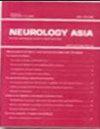Serum galectin-3 as a potential predictive biomarker Is associated with post-stroke depression
IF 0.2
4区 医学
Q4 CLINICAL NEUROLOGY
引用次数: 0
Abstract
Objective: As an inflammatory mediator, serum galectin-3 is involved in a variety of biological processes, including fibrosis, angiogenesis, apoptosis and immune activation, as well as in the physiological and pathological processes of multiple nervous system diseases. The aim of this study was to investigate the relationship between serum galectin-3 and post-stroke depression in acute ischemic stroke (AIS) patients. Methods: Baseline data of patients with AIS admitted to the Department of Neurology, First Affiliated Hospital, Shihezi University School of Medicine from October 2021 to May 2022 were continuously collected. The general data of the patients were collected and serum galectin-3 levels were measured. Hamilton Depression Scale was used to evaluate the occurrence of post-stroke depression. Results: The level of serum galectin-3 was increased in AIS patients with post-stroke depression. The prevalence of post-stroke depression increased with the increase of serum galectin-3 level, suggesting that serum galectin-3 was associated with post-stroke depression. The findings from the ROC curve showed that the area under the curve of serum galectin-3 as a possible biomarker for diagnosing post- stroke depression in AIS patients was 0.719. The sensitivity and specificity were 78.1% and 65.2%, respectively. Multivariate logistic regression analysis showed that serum galectin-3 level remained to be a predictor of post-stroke depression. Conclusions: Elevated serum galectin-3 levels are linked to a higher risk of post-stroke depression. Serum galectin-3 may be a promising biomarker for clinical monitoring of post-stroke depression.血清半乳糖凝集素-3作为潜在的预测性生物标志物与脑卒中后抑郁相关
目的:血清半乳糖凝集素-3作为一种炎症介质,参与多种生物学过程,包括纤维化、血管生成、细胞凋亡和免疫激活,并参与多种神经系统疾病的生理病理过程。本研究旨在探讨急性缺血性脑卒中(AIS)患者血清半乳糖凝集素-3与脑卒中后抑郁的关系。方法:连续收集石河子大学医学院第一附属医院神经内科2021年10月至2022年5月AIS患者的基线资料。收集患者一般资料,测定血清半凝集素-3水平。采用汉密尔顿抑郁量表评估脑卒中后抑郁的发生情况。结果:AIS合并脑卒中后抑郁患者血清半凝集素-3水平升高。脑卒中后抑郁的发生率随血清半凝集素-3水平的升高而升高,提示血清半凝集素-3与脑卒中后抑郁有关。ROC曲线结果显示,血清半乳糖凝集素-3作为诊断AIS患者脑卒中后抑郁的可能生物标志物的曲线下面积为0.719。敏感性为78.1%,特异性为65.2%。多因素logistic回归分析显示血清半凝集素-3水平仍然是脑卒中后抑郁的预测因子。结论:血清半乳糖凝集素-3水平升高与卒中后抑郁的高风险相关。血清半乳糖凝集素-3可能是脑卒中后抑郁临床监测的一个有前景的生物标志物。
本文章由计算机程序翻译,如有差异,请以英文原文为准。
求助全文
约1分钟内获得全文
求助全文
来源期刊

Neurology Asia
CLINICAL NEUROLOGY-
CiteScore
0.30
自引率
0.00%
发文量
76
审稿时长
>0 weeks
期刊介绍:
Neurology Asia (ISSN 1823-6138), previously known as Neurological Journal of South East Asia (ISSN 1394-780X), is the official journal of the ASEAN Neurological Association (ASNA), Asian & Oceanian Association of Neurology (AOAN), and the Asian & Oceanian Child Neurology Association. The primary purpose is to publish the results of study and research in neurology, with emphasis to neurological diseases occurring primarily in Asia, aspects of the diseases peculiar to Asia, and practices of neurology in Asia (Asian neurology).
 求助内容:
求助内容: 应助结果提醒方式:
应助结果提醒方式:


